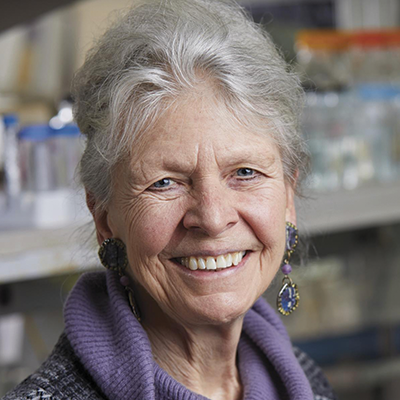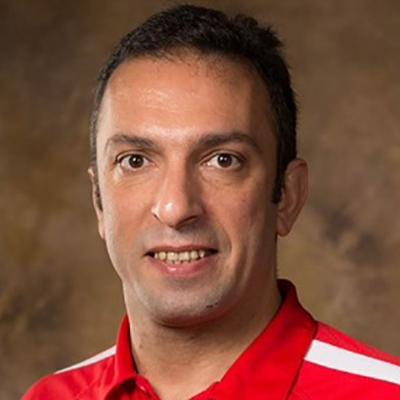UK society honors Steitz; Alrubaye wins Purvis award; Fierke moves to Brandeis
Steitz receives Microbiology Society prize
Joan Steitz, the Sterling professor of molecular biophysics and biochemistry at Yale University and a Howard Hughes Medical Institute investigator, will receive the 2021 Prize Medal from the United Kingdom’s Microbiology Society.

“Britain and British science have occupied a special spot in my heart ever since I was a postdoctoral researcher at the Laboratory for Molecular Biology in Cambridge in 1967–70,” Steitz told the Microbiology Society. “So much of my subsequent life and science were shaped by my experiences there.”
Steitz is known for her studies involving RNA, including insights into how ribosomes interact with messenger RNA and the splicing of introns by small nuclear ribonucleic proteins, or snRNPs, which occur in eukaryotes. As a postdoc, she studied translation initiation in bacterial systems. After joining the faculty at Yale, she published her findings demonstrating that ribosomes use complementary base pairing to identify the start site on mRNA. Her discovery of the role of snRNPs and the related small nucleolar RNPs in splicing explains why humans have only double the number of genes of a fruit fly. Her work could provide insights into diagnosis and treatment of autoimmune disorders that develop when patients make anti-nuclear antibodies against their own DNA, snRNPs or ribosomes.
A fellow of the National Association for the Advancement of Science and the American Academy of Microbiology and a member of National Academy of Sciences and the National Academy of Medicine, Steitz has received many honors, including Lasker-Koshland Special Achievement Award in Medical Science, the National Medal of Science, the American Society for Cell Biology’s E.B. Wilson Medal and the American Society for Biochemistry and Molecular Biology’s 2015 Herb Tabor Research Award.
Steitz will receive her award and present a lecture at the Microbiology Society’s annual conference in April, which will be held online.
Alrubaye wins award for international education
Adnan Alrubaye of the University of Arkansas won the 2020 Hoyt H. Purvis Award for Service in International Education.

Alrubaye, a research assistant professor and the associate director for the university’s cell and molecular biology program, is credited with having helped double to size of the graduate program through recruitment of students from the Middle East and elsewhere. He has made numerous trips abroad to meet with prospective students, government officials and administrators at academic and research institutes.
In a statement, Dean Patricia Koski, said, “He has been a leader in community international relations and in the Muslim community on campus, and he is dedicated to bringing different religions together for peace and understanding.”
The Purvis award, which was issued to three members of the university community during a Nov. 19 ceremony online, is named after an emeritus professor of journalism and international relations. Alrubaye, who teaches microbiology, animal bacteriology and prokaryote biology to about 900 students annually and who was recently inducted into the university’s teaching academy, won the faculty award.
Alrubaye earned bachelor’s and master’s degrees from the University of Baghdad in the early 2000s. He went on to earn his master’s in secondary education and his Ph.D. in cell and molecular biology at the U of A Fayetteville campus in northwest Arkansas, where he also completed a postdoctoral stint.
He has won numerous teaching awards, including the university’s Most Outstanding Faculty Member award in 2019.
Fierke joins Brandeis leadership
Carol Fierke, who was until recently a provost and executive vice president at Texas A&M University, is now provost, executive vice president and chief academic officer at Brandeis University in Waltham, Massachusetts. She assumed her new duties on Jan. 1.
Fierke earned her doctorate in biochemistry at Brandeis in 1984 and conducted postdoctoral research at Pennsylvania State University. Her first faculty position was at Duke University, after which she spent almost 20 years as a professor at the University of Michigan. Prior to moving to Texas A&M, she served as Michigan’s chemistry department chair, vice provost and dean.
Fierke’s research group studies metalloenzymes in yeast and human cells, including structural studies of metal ions and substrates in the active site of catalytic RNAs and proteins. She also has been committed to advancing diversity in the departments where she has worked.
She received the 2020 Mildred Cohn Award in Biological Chemistry from ASBMB and has also been recognized with the American Chemical Society’s Repligen Award in the Chemistry of Biological Processes and the Protein Society’s Emil Thomas Kaiser award.
Brandeis President Ron Liebowitz praised Fierke’s management, research and mentoring skills in an article on the university’s website, saying, “As a consensus builder with a demonstrated commitment to making institutions more diverse, equitable and inclusive, Dr. Fierke is already a champion of the values that have defined the Brandeis community since 1948.”
Enjoy reading ASBMB Today?
Become a member to receive the print edition four times a year and the digital edition monthly.
Learn moreGet the latest from ASBMB Today
Enter your email address, and we’ll send you a weekly email with recent articles, interviews and more.
Latest in People
People highlights or most popular articles

Finding a symphony among complex molecules
MOSAIC scholar Stanna Dorn uses total synthesis to recreate rare bacterial natural products with potential therapeutic applications.

Sketching, scribbling and scicomm
Graduate student Ari Paiz describes how her love of science and art blend to make her an effective science communicator.

Embrace your neurodivergence and flourish in college
This guide offers practical advice on setting yourself up for success — learn how to leverage campus resources, work with professors and embrace your strengths.

Survival tools for a neurodivergent brain in academia
Working in academia is hard, and being neurodivergent makes it harder. Here are a few tools that may help, from a Ph.D. student with ADHD.

Quieting the static: Building inclusive STEM classrooms
Christin Monroe, an assistant professor of chemistry at Landmark College, offers practical tips to help educators make their classrooms more accessible to neurodivergent scientists.

Hidden strengths of an autistic scientist
Navigating the world of scientific research as an autistic scientist comes with unique challenges —microaggressions, communication hurdles and the constant pressure to conform to social norms, postbaccalaureate student Taylor Stolberg writes.

